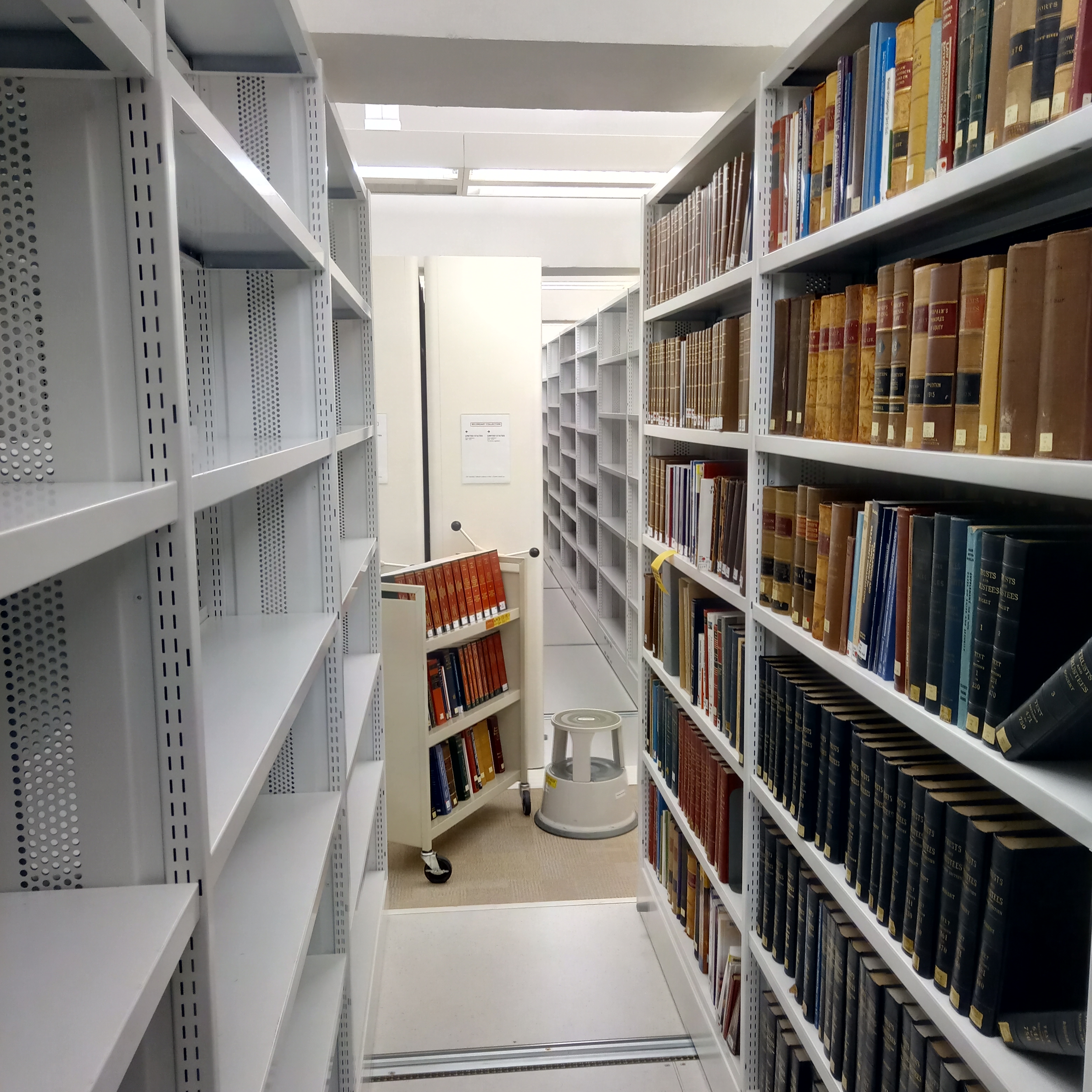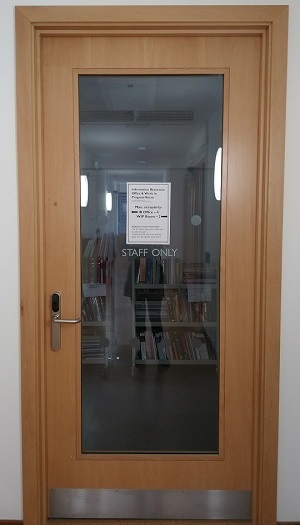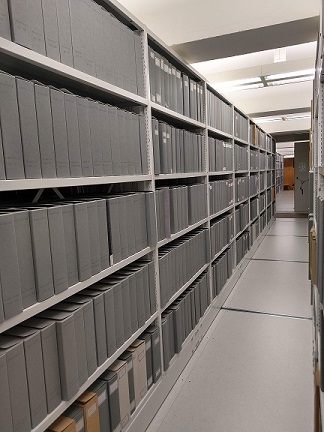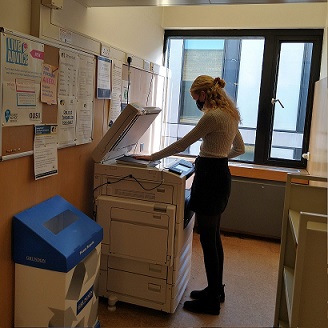If you’re familiar with this blog, you’ve probably gathered by now that there are two Law trainees. Law is a large library, with a team working in three subsections: Academic Services (where Josie is based), Information Resources (where Jess is based), and Official Papers (technically a separate collection housed within the library, with a small team of its own). Although we share some tasks and both spend time out on the enquiry desk, there are some general differences between the two positions – the IR trainee is generally surrounded by various stages of book processing, while the AS trainee shares an office with the librarians responsible for delivering the LRMSP, an undergraduate legal research course. With that in mind, here are two days in the life at the LawBod!
8.45
Josie: I arrive at the library and make my way up to my office on the second floor, opening any windows I pass along the way. Depending on who’s already here, there may be some reshelving to do as well – although restrictions have eased a lot since the start of our traineeship, we still have some variable working patterns going on, so the division of opening-up duties changes from day to day.
Jess: I pack my things away in my locker, hanging up my coat and heading out to open some of the Law Library’s many windows. I keep an eye out for any shelving before heading up (or down) to the Information Resources office.
9.00
Josie: The first thing I do after catching up on emails and messages is check the scan request queues. Although I’m not involved in triaging requests for the library, I do a lot of the scanning, so it’s useful to know if much will come my way later in the day. Beyond this point, the shape of my day is largely determined by my fluctuating ability to sit still and focus on spreadsheets. I really appreciate being able to manage my own time here – I work on a variety of long-term projects, so once I’ve accounted for things like meetings and desk shifts, I can play it by ear and go wherever I’ll be most productive for the next while.
Jess: I clear any new emails and Teams messages, checking to see how much is on each of the shelves in the WIP (work-in-progress) room I have responsibility for, as well as the enquiry desk rota, before drawing up a schedule of tasks for the day.
9.10
Josie: I’m currently working through a trolley of jurisprudence books, part of our ongoing reclassification project. This is a good task to fill an hour or so, as there’s only so much legal philosophy I can google or translate my way through before everything starts turning to word soup.
Jess: Schedule in hand, I start the day by gathering up any books ready for labelling on the designated shelf. We have two different labels types, depending on whether a book is likely to be reclassified in the somewhat near future (more on that later) or not. I fill in the shelfmarks for the new books before printing two sheets of labels. I affix each new label to the relevant spine or the front cover if a shelfmark is particularly long (looking at you EuroComm) or a book is particularly short. Any shelfmark we expect to be correct for some time has a label protector placed over it to keep it legible for years of readers to come. These then go on yet another shelf where someone from Academic Services checks them in order to catch the (hopefully occasional) errors that seep in despite my best efforts. They are then shelved for our readers to find.
10.00
Josie: Every Monday the AS staff have a short meeting over Teams, catching everyone up on the past week’s activities and giving a heads-up for any upcoming absences or unusual occurrences. I take minutes for these and upload them to the Teams channel shortly afterwards. Once a month, I go straight from this to taking minutes for the Bodleian’s ORLO Operations Group meeting, which lasts through to lunchtime and involves many more acronyms. (ORLO = Oxford Reading Lists Online, interactive reading lists which link directly to access points for online resources).
Jess: We usually have the Law Library staff meeting on a Thursday, where Helen Garner – the fabled Law Librarian – updates us on all the relevant changes and goings-on in both our own library and the Bodleian at large. This year, there has been plenty of information about the various changing COVID procedures and restrictions as well as questions around journals, online resources, and more.
10.45
Josie: I keep working on the jurisprudence books for now, as I’ll be going over my suggested new shelf marks with the IR librarian tomorrow. However, being part of AS means that it’s not unusual for someone to drop by the office or message me on Teams with a quick job to do instead – getting ahead on admin for next term’s LRMSP sessions, fixing glitchy columns in the tea room budget spreadsheet, and testing out new hiring or induction materials are all part of a day’s work.
Jess: A quick stop for tea and a book. At present, I’m (very happily) weighed down with the tome that is Shamsur Rahman Faruqi’s The Mirror of Beauty.
11.05

Josie: There are few scan requests ready and waiting, so I make a note of the details and go searching for books. Most issues get ironed out by the triage team, but a little detective work is occasionally needed – I once spent most of a desk shift using an incomplete citation to track down a Scottish law report from 1807!
We’re lucky to have a high-tech Bookeye scanner, which can split double pages, crop messy edges, and automatically makes files OCR accessible. Once the scans are done, I use a PDF editor to double-check for missing pages and reduce the file size, then fill in our record of completed scans and add the file to our repository in case it’s requested again. When the same scan is requested by multiple people, it’s often related to a particular course, so it’s useful to already have a good-quality scan that can be sent out again or potentially go straight onto ORLO or LB4S (LawBod 4 Students – more on that later).
Jess: I take an hour to complete various smaller tasks that need managing around the office. I stamp, add security, and label any books that have arrived via purchase or donation – often much smaller than our copyright deliveries. I print some new bookplates for our generous series of donations from the Supreme Court of Korea, which have their own unique design and are possibly the only thing I print in colour. I check up on the status of books that have not arrived from previous copyright deliveries, making sure they are still on their way to us and haven’t ended up at the BSF. I fix any incorrect labels, and make new ones for books that have been spotted with theirs peeled off.
12.00
Josie: I’ll be on desk at one, so – depending on how long the scans take, and how many times the PDF editor crashes in the process – I aim to take my lunch at around noon. It’s easy to spend the whole day inside, so I’m making more of an effort to take my book and lunch outside as the weather improves.
Jess: Since Thursday is Josie’s day at the SBS, I gather up the day’s scan requests so far to avoid them returning to a large stack.
1.00
Josie: Time for my desk shift! Most enquiries tend to be about navigating the library, although as we’re currently in a vacation period, the number of students in search of PCAS machines and reading list materials has somewhat decreased. I give a quick summary of the library’s layout to a visiting researcher, direct someone asking about Ted Hughes across the building to the English Faculty Library, and take another reader down to the ground floor to help them find a report in the Official Papers collection.
Jess: Thursday afternoons often hold cataloguing lessons. I’m learning to create basic records for a variety of items, known as Minimal Level Records. These records contain key information about the item’s title, author, publisher etc., allowing it to be located by any reader looking specifically for that item, or items by that author, but miss a lot of the detail in a full record (such as Library of Congress subjects) that are helpful for resource discovery when researching. However, they are an ideal place to start learning to catalogue! I create new records for a small stack of Official Papers material; going through the first few record creations in detail with Tanya before leaving me to finish the rest of the stack without supervision to check for errors later (is this homework?).
2.00
Josie: Between enquiries, my usual desk task is an LB4S checking project. Since it’s important that law students learn to find their own resources, a lot of the undergraduate courses don’t get ORLO lists. However, we still need a way to supply digitised versions of required readings that aren’t widely accessible (the Law Quarterly Review, for example, has a 35-year gap in its online provision), so there’s a designated LB4S section on each course’s Canvas site. Since it’s been a chaotic couple of years for online resource provision, my job is to work through each course and make sure that everything is in order on the copyright side of things, as well as generally tidying up the pages and checking for any resources that have become available online since being uploaded.

Jess: A late lunch today, as I find that keeps my energy up for my evening shift. I occasionally drop by the EFL, just a staircase away, in order to exchange my poetry reads.
3.00
Josie: After desk, I take a tea break and check the post room for blue BSF crates before deciding how to spend the afternoon. It’s been a few days since I got round to one of my other ongoing tasks, so I find an empty trolley on the ground floor and start moving some books. As a legal deposit library, we keep all the up-to-date publications on the upper floors, but also hoard superseded editions and early journals down in the rolling stacks. Inevitably, there are some overcrowding issues, so we’re working through a several-step plan to get what space we have into a more useful location. There’s something very satisfying about closing up the shelf space left for a report series we haven’t received in hard copy since the mid-2010s, but metal shelving is unforgiving of clumsiness – the clanging occasionally attracts a lost reader.

Jess: Usually by this point of the day, the post has arrived! The ‘Virtual Book Display’ is a list of all the legal deposit books the Bodleian has received that week, and Felicity, head of all things in Information Resources, selects the law-relevant titles that then arrive on a Thursday. I record which ones have arrived using a traffic light system on my spreadsheet, having a weekly check of any missing titles to see if they have found their way to another library or the BSF – and sometimes the shelves! Each book receives stamps and security measures before being placed on the designated VBD shelf where the library’s cataloguers – Tanya and Rebecca – pick them up. Whilst the size of this delivery varies week-on-week, it’s usually sizeable – I often process several hundred books a term!
4.30
Josie: Law books tend to be heavy, so I’m careful to leave off the book moving before overdoing it. For the last part of the day, I head back to the office and clear up any leftover tasks – shelving in the main reading room, another scan or two, or working on a blog post like this one.
Jess: Break time! I devour a quick chapter of my book and a fortifying snack.
4.50
Jess: I tie up any loose ends at my desk before prepping my trolley for my evening desk shift.
5.00
Josie: Once a week I stay on for an evening shift, but not today! I finish off whatever I’m currently working on, make a quick note of anything I ought to prioritise tomorrow, then sign off for the day and head home.
Jess: Late shifts are shared out between members of library staff, and Thursday is my anointed day. There are often fewer reader enquiries at this hour, so I head to the Jurisprudence section to pick up the thirty-two titles on my sheet. My temporary stealing of books from the shelves is part of the MOYS reclassification project – the library is changing over from its old shelfmark style to a new one (MOYS, hence the name) which is a Library of Congress style system designed specifically for law books. I check over tables of contents, introductions, and skim over a few chapters to get a sense of which shelfmark is right, going outside of jurisprudence where needed – and if a book is particularly opaque, I’ll dig further. The library has many foreign language holdings, so I also have a bookstand at the ready to use DeepL to supplement my language skills –French, German, Spanish, Italian and Portuguese are most common, with some surprises! I keep a running Word document with various keywords in an attempt to improve my language skills and I like to think I am starting to get a foothold in my incredibly specific vocabulary – I cannot tell you what the verb for ‘to eat’ is in German, but I can recognise the word for ‘constitution’ about 50% of the time…
7.00
Jess: Time to go home! As my longest day of the week, I usually reward myself with pizza – and get my hours back in exchange by way of an early 3PM finish on Tuesdays.



















Recent Comments